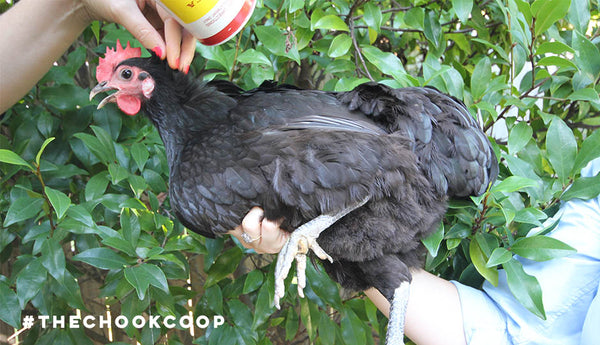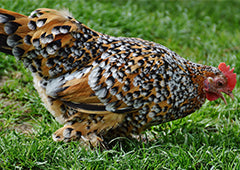While it may not be the most delightful of topics, chicken poop is a serious matter- well to backyard chicken keepers anyway!
A chicken’s poop is an important indicator of their health, and while it isn’t quite as nice as collecting eggs or giving treats, checking your chickens poop is a task that should be done regularly.
So what’s normal and what’s not in the world of chicken poop? Read on (if you’re game) to find out!
1. Normal Poop
Healthy chicken poop (fecal poop) can vary greatly depending on diet, how long it has been there for, and the climate. However, it is generally green or brown in colour, has a whitish chalky ‘cap’ of urates, and should be quite firm- if it is slightly runny, this again have to do with their diet and is not a real cause for concern unless it happens regularly. If it is particularly green in colour, don’t be alarmed, this just means your girl has been busy foraging in fresh green grass. The same goes for droppings that are particularly dark- if they have a diet rich in dark foods, dark poops will often result.
Broody Poop
A broody poop, while completely normal, is a very obscene one. As broody hens don’t like to leave their nest too often, instead of doing their business regularly, they will retain their droppings throughout the day, which will result in a very large, green or brown and unpleasant looking and smelling poop.
Cecal Poop
Chickens can also produce droppings that are known as cecal poop. Cecal poop is produced from the caecum of the chicken and are expelled every 8-10 droppings. It is generally thicker and stickier than normal, and can range from yellow to black in colour and has a particularly obscene smell. As unpleasant as it might be, cecal poop is a good indication that the digestive tract is working properly.
Intestinal Lining Poop
You may stumble across a dropping with what looks like a red lining, alarming- yes, cause for concern- no. This is just your chickens shedding intestinal lining which is completely normal if it is a rare occurrence.
Watery Poop
If your hens have produced very watery droppings, it may be because they are overheating, and so drink large amounts of water to help them cool down. If this is an isolated incident it is nothing to worry about, however if it is happening often, it can mean your hen is not eating enough, and so this should be monitored.
2. Abnormal Poop
While healthy droppings can vary in size, texture, smell and appearance, there are a number of major things to look out for that are warning signs for your hens health.
Blood in Poop
If blood is found in a chickens faeces, this can be an indication that a chicken has coccidiosis. This is a serious intestinal infection that can spread to your entire flock, and can unfortunately result in death if not attended to properly.
Worms in Poop
Worms found in your chickens droppings means they have an infestation of worms and so should be medicated appropriately. It is important to medicate your entire flock as worms can spread easily.
Diarrhoea
Diarrhoea generally has a runny and greasy consistency and often yellow or mustard in colouring, and can be the result of the occasional hiccup in their diet, where your chicken has feasted on something their stomach just doesn’t agree with. However, if it is a regular occurrence, it should be inspected, as it can be a sign of internal parasites such as worms.
Watery Urates Poop
If your chicken produces droppings that are very white and runny regularly (the urates is runny), this should be monitored closely as it can be an early indication of a kidney problem- more so common in older birds.
If you happen to come across an abnormal chicken poop, it is important to note whether it is an isolated incident, or one that is recurring. You should also check for other symptoms in your chickens that may signify illness or disease, such as: weight loss, loss of appetite, lethargy, sullen appearance or a drop in egg production. If these are established, appropriate further treatment should be undertaken.
So in between collecting eggs, refreshing nesting boxes and scattering feed, make sure you check the ground for a dropping or two.
As chicken keepers, we want to do an eggcellent job when caring for our feathered friends. From poop to proteins, make sure that you've got the knowledge you need to raise a happy, healthy flock. Did you know 67% of chicken keepers surveyed experienced a chicken health or behaviour issue in the first 12 months that they didn’t know how to handle?
But don’t worry! Our feathered friends over at Chickenpedia have created a Chicken Healthcare Course. It is a comprehensive online course that covers everything you need, including what to look for in an unhealthy chicken and how to support your egg-laying hens to optimal health. All of their courses are really well structured and filled with vital knowledge, which is why I highly recommend them to all of my readers! From raising baby chicks to feeding to behavior, you’ll find valuable information that’ll give you the knowledge and confidence to successfully look after your chickens.
Check out Chickenpedia today. As a member, you will also get access to the ALL of their chicken courses!

















